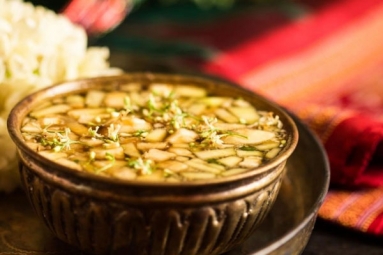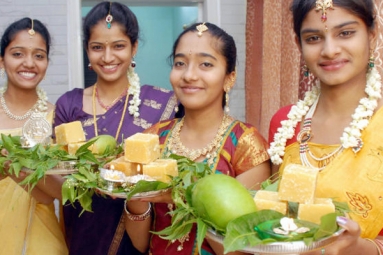
(Image source from: Ugadi)
'Ugadi', the spring festival, heralds the beginning of the first month of Telugu calendar, i.e. Chaitram. Observed as New Year Day by the people of entire Deccan region, 'Ugadi' is also celebrated in other Indian states of Karnataka, Maharashtra, Goa, Tamil Nadu and Kerala by different names.
The Maharashtrians celebrate the day as 'Gudi Padwa' while the Rajasthanis observe it as 'Thapna'. For the Sindhis too, this day marks the New Year in their calendar and is celebrated as 'Cheti Chand'.
The word 'Ugadi' or 'Yugadi' is derived from the Sanskrit words yuga (meaning age) and ādi (meaning the beginning), meaning "the beginning of a new age".
The festival of Ugadi falls on a different day every year, based on the Hindu lunisolar calendar. It marks the first day in the Saka calendar.
People across states ring in the new year with fervor, feast and fanfare. Families and friends come together to make a new beginning in the traditional way.
Significance:
The significance of Ugadi stretches back to Indian mythology and the time when Lord Brahma, the creator of the universe, started a series of wonderful creations, including earth and all forms of life dwelling on it. Ugadi is a commemoration of that special day on which Lord Brahma began his creative task. It is not only the first day of the South Indian lunar calendar, but also marks the new astronomical cycle into motion.
Rituals:
Leaving the past behind and starting afresh with positivity forms the main aspect of Ugadi. People perform ritualistic pujas and seek blessings from God. This is why 'Ugadi' is considered the best time of the year to flag off new ventures or personal goals.
The day is preceded by the pre-Ugadi preparations that begin a few days before the actual day. It includes thoroughly cleaning the entire household and shopping for new clothes and other items that go with the requirements of the festival.
The day begins with devotees waking up before dawn and taking oil baths after which they decorate their houses with colorful rangolis and mango leaf festoons.
Ugadi Pachhadi, a unique dish of six different tastes — sweet, salty, bitter, sour, hot, tang — is eaten on this day. This special 'Ugadi' delicacy is prepared by using six specific ingredients – neem buds/flower, jaggery, green chilly/pepper, salt, tamarind juice and unripe mango. Each of the ingredients symbolizes sadness, happiness, anger, fear, disgust, and surprise.
Ugadi Pachhadi is consumed by all members of the family. Other home-made delicacies like Bhakshyalu or Obbatu are also eaten on this day.
Panchangam
People listen to th recitation of the Panchangam (almanac) on new year. It is basically an informal social function where the forecast of the entire year is read out aloud by an elderly person of the family or a respected person. The event is called 'Panchanga Sravanam'.
AW: Suchorita Chowdary











